Sensitivity is heightened when dealing with sex crimes or extreme abuse allegations. It’s uncomfortable to talk about the subject of sex crimes or extreme abuse – but it’s even harder to stand unfairly accused of such an act.
Children who have allegedly been victimized are interviewed in a unique setting by trained professionals through a process called a forensic interview. A forensic interview is a neutral, fact-finding interview conducted in an objective tone. These interviews are designed to provide evidence that can be later used in court.
How does this affect your defense?
Several protocols exist among forensic interview practices, including child-led accounts and specific rules for questioning. Often these interviews are recorded, which means they could prevent a victim from having to reinterview several times.
This is understandable, but it does make protecting your rights as a defendant a bit more challenging.
How can a witness be cross-examined after a forensic interview?
The intended purpose of a recorded victim interview is to minimize the need for multiple interviews. While some courts allow the forensic interview to stand in place of child testimony, that isn’t always the case.
Even with a recorded forensic interview, you can still:
- Cross-examine the interviewer
- Evaluate the bias in questioning
- Question the detective
- Cross-examine the child welfare worker
Other agencies involved with crimes against children often include police, schools, and child welfare agencies. Each representative involved can be brought in to testify. If multiple agencies have been involved during the process of an investigation. In that case, that means there is a lot of information to cross-examine.
Facing court proceedings after a forensic interview
The forensic interview doesn’t prevent the right to a fair trial. An experienced defense can make sure that your rights are protected through due legal processes.

